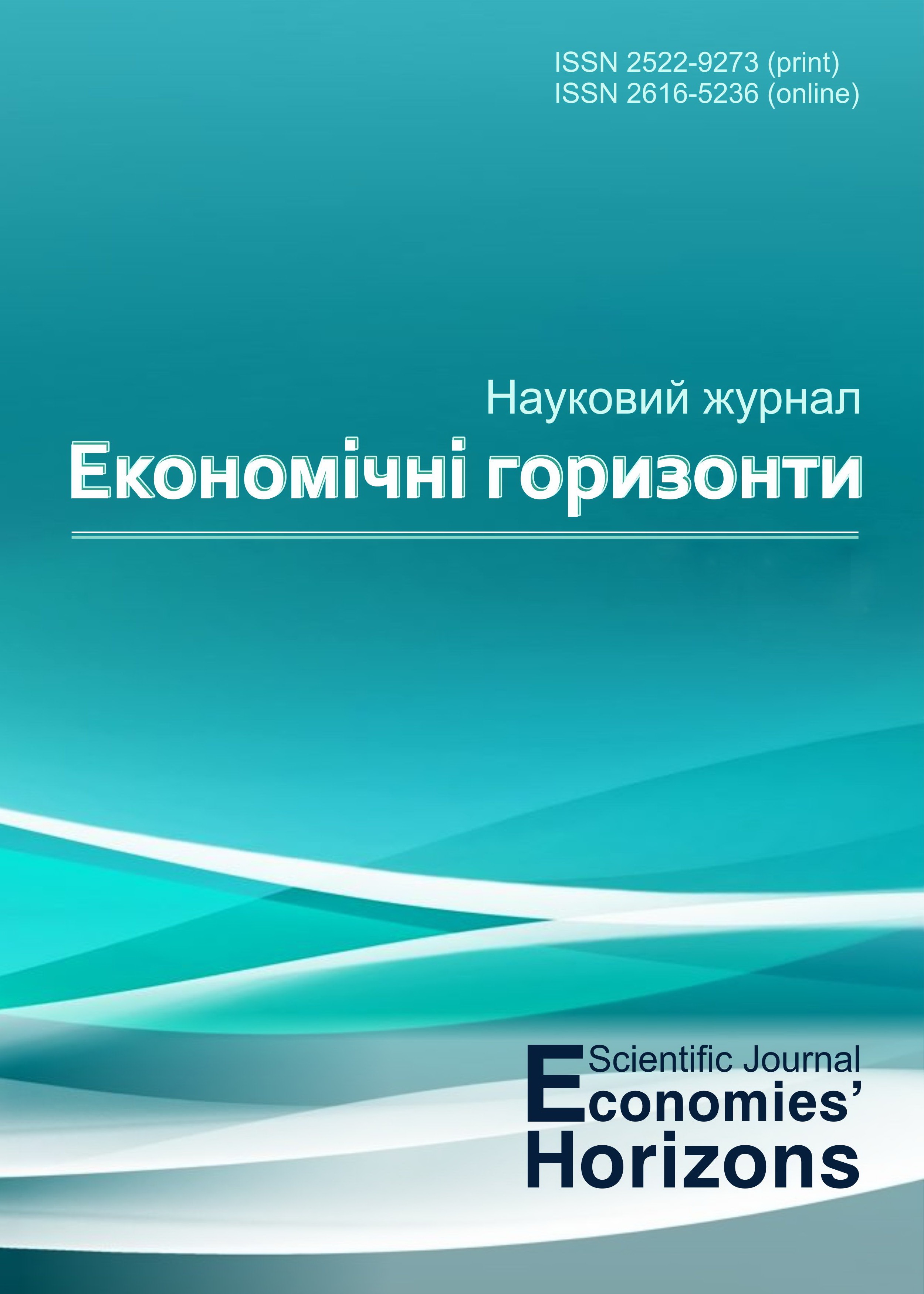КОНЦЕПТ СТАЛОЇ ДИДЖИТАЛІЗАЦІЇ ЯК БАЗИС ЗЕЛЕНОГО-ЦИФРОВОГО ПЕРЕХОДУ ДО КЛІМАТИЧНО-НЕЙТРАЛЬНОЇ ЕКОНОМІКИ
DOI:
https://doi.org/10.31499/2616-5236.3(28).2024.310264Ключові слова:
світова економіка, кліматична нейтральність, цифрова трансформація, інновації, цифровий-зелений перехід, подвійний перехід, стала диджиталізація, зміни клімату, зелена економіка, цифровий розривАнотація
У статті запропоновано концептуальний підхід до сталої диджиталізації як основної рушійної сили зеленого-цифрового переходу на шляху до кліматичної нейтральності світової економіки. Проаналізовано перспективи такої взаємодії, а також визначено можливі бар’єри та ризики. Запропоновано триступеневу модель гармонізації цифрового та зеленого переходу, що базується на концепті сталої диджиталізації та спрямована на досягнення кліматичної нейтральності. Визначено складові інноваційного стрибка, який потрібен для досягнення кліматичної нейтральності у короткостроковій та довгостроковій перспективі
Посилання
Lange, S., Santarius, T. (2021). Digitalization and Sustainability. London: Routledge. 198 p.
Rolnick, D., Donti, P., Kaack, L., Kochanski, K. et al. (2022). Tackling Climate Change with Machine Learning. ACM Computing Surveys. Vol. 55, Issue 2. P. 21-96. DOI https://doi.org/10.1145/3485128
Hedberg, A., Sipka S. (2021). Building a circular economy the role of information transfer. URL: https://www.epc.eu/en/publications/Building-a-circular-economy-The-role-of-informationtransfer~43d53c.
Pietrón, D., Staab, P., Hofmann, F. (2022). Sustainable Digital Market Design: A Data-Based Approach to the Circular Economy. ECDF Working Paper Series. #001. pp. 1-25. DOI http://dx.doi.org/10.14279/depositonce-15014
IIASA (2020). The Digital Revolution and Sustainable Development: Opportunities and Challenges. The World in 2050. 150 p. URL: https://pure.iiasa.ac.at/id/eprint/15913/.
Santarius, T., Pohl, J., Lange, S. (2020). Digitalization and the Decoupling Debate: Can ICT Help to Reduce Environmental Impacts While the Economy Keeps Growing? Sustainability. Vol.12(18). P. 74-96. DOI https://doi.org/10.3390/su12187496
Frick, V., Matthies, E., Thogersen, J., Santarius T. (2021). Do online environments promote sufficiency or overconsumption? Online advertisement and social media effects on clothing, digital devices, and air travel consumption. Journal of Consumer Behavior. Vol. 20(2), P. 288-308. DOI https://doi.org/10.1002/cb.1855
ECS SRIA (2023). Strategic Research and Innovation Agenda. URL: https://ecssria.eu/download.
EFFRA & European Commission (2021). MADE IN EUROPE. The manufacturing partnership in Horizon Europe. 98 p. URL: https://www.effra.eu/sites/default/files/made_in_europe-sria.pdf.
Vasilescu, M., Dimian, G., Gradinaru, G. (2023). Green entrepreneurship in challenging times: a quantitative approach for European countries. Economic research-Ekonomska istraživanja. vol. 36, no. 1. P. 1828-1847.
Maksymova, I., Mietule, I., Kulishov, V. (2023). Digital Solutions for a Climate Neutral Economy: International Framework of Eco-Digital Projects. ENVIRONMENT. TECHNOLOGIES. RESOURCES. Proceedings of the International Scientific and Practical Conference. Vol. 1. pp. 123-127.
Diodato, D., Huergo, E., Moncada-Paternò-Castello, et al. (2023). Introduction to the special issue on “the twin (digital and green) transition: handling the economic and social challenges”. Industry and Innovation. 30(7).
EIT Digital. (2022). Makers & Shapers: Digital Technologies and the Green Economy. URL: https://www.eitdigital.eu/our-messages/makersshapers/reports/.
Petmesidou, M., Guillén, A. M. (2022). Europe’s green, digital and demographic transition: A social policy research perspective. Transfer: European Review of Labour and Research, 28(3), 317-332.
European Commission. (2023). Strategic Foresight. URL: https://commission.europa.eu/strategy-and-policy/strategic-planning/strategic-foresight_en .
Freeman, R. (2018). A theory on the future of the rebound effect in a resource-constrained world. Frontiers in energy research. #6. 369526.
Krysovatyy, A., Maksymova, I., Kurilyak, V. et al. (2024). International convergence towards a climate-neutral economy: modeling the agricultural sector. Agricultural and Resource Economics: International Scientific E-Journal. 10(2). pp. 52-79.
Joint Research Centre. (2020). Destination Earth: Survey on “Digital Twins” technologies and activities, in the Green Deal area. URL: https://data.europa.eu/doi/10.2760/430025.
Đorić, Ž. (2022). Digital divide in European Union: State and perspectives. Ekonomski pogledi. URL: https://consensus.app/papers/digital-european-union-state-perspectives-đorić/55a05f91e3355fd7a59a282fd91ff09e/?utm_source=chatgpt .
Espinosa, A., & Walker, J. (2017). A Complexity Approach to Sustainability: Theory and Application. London: World Scientific.
Barik, N. (2023). Global research on digital divide during the past two decades: a bibliometric study of Web of Science indexed literature. Global Knowledge, Memory and Communication. https://doi.org/10.1108/gkmc-08-2022-0207
International Energy Agency (2023). World Energy Outlook 2023. URL: https://www.iea.org/reports/world-energy-outlook-2023.
Forti V., Baldé C.P., Kuehr, P. et al. (2020). The Global E-waste Monitor 2020: Quantities, flows and the circular economy potential. United Nations University (UNU)/United Nations Institute for Training and Research (UNITAR). Bonn/Geneva/ Rotterdam.
World Bank (2020). Minerals for Climate Action: The Mineral Intensity of the Clean Energy Transition. http://pubdocs.worldbank.org/en/961711588875536384/Minerals-for-Climate-ActionThe-Mineral-Intensity-of-the-Clean-Energy-Transition.pdf.
Vosoughi, S., Roy, D., Aral S. (2018). The spread of true and false news online. Science 359(6380). pp. 1146–1151
Church, C., Crawford, A. (2018). Green Conflict Minerals: The fuels of conflict in the transition to a low-carbon economy. International Institute for Sustainable Development.
EU publication office (2023). Strategic foresight report 2023. 58 p. DOI 10.2792/32296
Coroama, V., Mattern, F. (2019). Digital Rebound - Why Digitalization Will not Redeem us our Environmental Sins. In Proceedings of the 6th International Conference on ICT for Sustainability (ICT4S 2019). CEUR Workshop Proceedings Volume 2382. URL: http://ceur-ws.org/Vol-2382/.
##submission.downloads##
Опубліковано
Як цитувати
Номер
Розділ
Ліцензія
Авторське право (c) 2024 Ірина Максимова

Ця робота ліцензується відповідно до Creative Commons Attribution-NonCommercial 4.0 International License.




